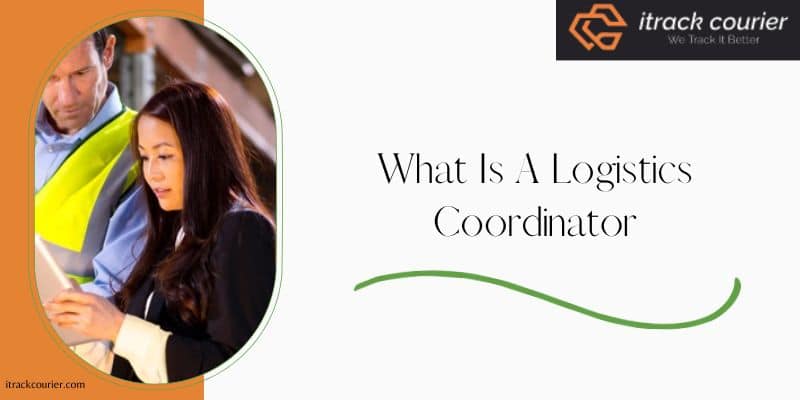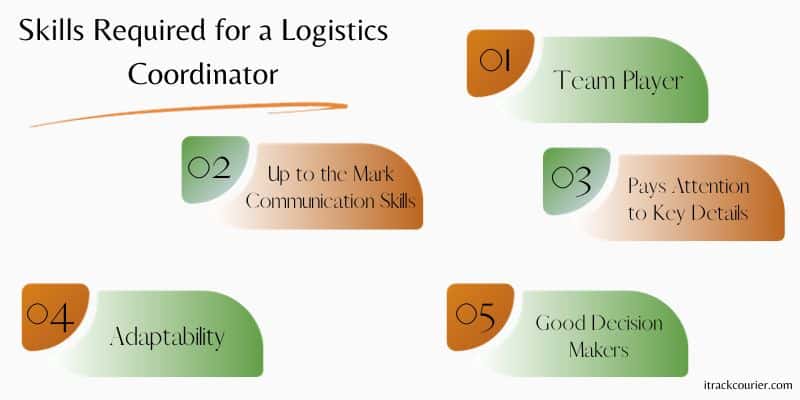Logistics Coordinators are experts in managing all aspects of a company’s supply chain, including inventory management and ensuring timely product shipments.
Moreover, they stay in touch with the consumers and wisely handle their delivery-related concerns to guarantee customer satisfaction.
If you plan to pursue a career as a Logistics Coordinator, we have good news for you!
According to a 2023 report, the US logistics industry has ranked over two trillion dollars in 2020 and is expected to grow even more by 2050. Therefore, exciting career opportunities are waiting for you at your doorstep.

Education Requirements
- Many companies require you to have a bachelor’s degree in business, supply chain management, or logistics.
- A Master’s degree is optional, but it will increase your chances of landing a high-paying job. This program teaches logistics systems and management of accounting and finances.
- In order to gain experience, enroll yourself for internships in related fields, and you must have 2+ years of experience in logistics management.
Job Duties of a Logistics Coordinator
A logistics coordinator has a hectic workday as they frequently need to adapt to different roles daily.
In the morning, they might need to sign a contract for a large shipment; manage inventory by lunch; and negotiate transportation costs later in the evening.
The job of the logistics coordinator is not only to supervise storage houses and shipments but also to perform all these tasks in a cost-effective way that would ultimately benefit the company.
Also Read: What Is 3PL Logistics
Let’s discuss the top 3 job duties that are generally included in a logistics coordinator job description. These will help you answer the question: what does a logistic coordinator do?
1. Supervise Product Shipment
Logistics coordinators work with different shipping companies and must be able to negotiate with shipping services on the costs and budgets beforehand.
Their goal is always to exceed customers’ expectations; for this, they also need to work with drivers and select the best routes for them.
On top of that, they must timely inform the customers about any emergencies that are causing a delay in their order delivery.
For example, thunderstorms, urban flooding, and political instability are common issues.
Not only that, but they must also follow the DOT and OHSA standards, which outline the precautions employers must take to safeguard their workers from dangers.
2. Management of Materials
Being a logistics manager is only some people’s cup of tea. If you are looking forward to becoming the apple of your boss’s eye, you must manage the supply of raw materials required in the high-output or make-to-order manufacturing industries.
Furthermore, they must follow supplier guidelines and state regulations to order and plan the storage of raw materials.
They manage production floor activities like raw material storage, replenishment, machine setup, and reorder quantity calculations.
3. IT and Data Management
Logistics coordinators sometimes spend even more time sticking to their computer screens to record storage, shipping, and overall performance data. They use various software to track the location and updates about the shipment.
The logistics department gathers and analyzes a variety of data to provide insightful updates to sales and production departments. They carry out routine administrative duties like processing shipping paperwork, documenting damaged goods, and keeping customer files.
Skills Required for a Logistics Coordinator
Now that you know the job duties of a logistics coordinator, let’s look at certain skills and qualities a good logistics manager must have.
Wanna know the company’s secret? They usually keep an eye on the following five traits:
1. Team Player
Behind every successful company is a good logistics coordinator’s hard work and dedication.
The key quality every company looks for in their logistics coordinators is their ability to work as a team. They have good communication and interpersonal skills, so they can delegate tasks to everyone, ensuring no one is overburdened.
In addition, they have a team-oriented behavior and appreciate the efforts of their members to boost their morale and productivity.
You are appropriate for this role if you have good leadership skills and an extroverted personality.
2. Up to the Mark Communication Skills
Logistics coordinators must have healthy relationships with their co-workers, bosses, salesmen, and customers.
Communication plays a significant role in logistics to build a good reputation and help your company grow inside out. You must develop the ability to communicate shipment information to all parties involved effectively and on time each day.
Customer loyalty and service keep customers coming back and advancing business objectives.
Excellent coordinators will pick up on these skills quickly, keeping customers informed, anticipating their needs, and figuring out how to keep them returning.
3. Pays Attention to Key Details
The best logistic coordinator has a keen eye on little details, is aware of how much stock is left, and timely reorders it to get it back on the shelf. They also check for damages or differences in the received product and compare both invoices to ensure they are not overcharged.
In light of this, a superb logistical coordinator will be well-organized.
They will continuously assess how their project is progressing. As a result, progress will be made effectively and quickly.
4. Adaptability
Supply chain management is constantly evolving; therefore, someone who can adapt well to changing situations and requirements is ideal for this role. Logistics coordinators must be flexible and modify and rearrange meetings without any frustration.
Additionally, they need to be able to adapt to every emergency and develop applicable solutions.
For example, during COVID-19, only an excellent logistic manager could have helped their company survive while ensuring their employees’ safety.
Check Also: What Is Reverse Logistics
5. Good Decision Makers
A logistics coordinator’s responsibility for making decisions is significant and frequent, so they must be made quickly!
Smooth shipments can be derailed by unforeseen events like broken down trucks, delays, bad weather, or misinformation in seconds.
Your ability to quickly make wise decisions under pressure will improve the longer you work in logistics. Based on past and future choices, the transportation process can be improved as long as you have a plan B.

Salary of a Logistics Coordinator
The average salary of a logistics coordinator in the United States ranges from $39,846 to $47,079 per year. Factors like education, experience, and location can also affect the pay rate. However, typically, logistics coordinators charge $19.16 to $25 per hour.
Top Paying Companies in the United States
- SLB: $105,918
- Google: $102,236
- Rothfos: $94,398
- E2open: $84,933
- Procter & Gamble: $82,579
Logistics Coordinator Interview Common Questions
Are you applying for a logistics coordinator job? Look no further because we have gathered a list of common questions that will help you prepare for your next interview.
- Describe a typical day of a logistics coordinator.
- What would you do if you were in charge of organizing a delivery and discovered that a portion of the product was harmed?
- What are the biggest difficulties you have encountered in supply chain management?
- What personalities make a successful logistics coordinator?
- Why do you feel you are qualified for this role as a logistics coordinator?
FAQs
What Are Some Challenges Faced By Logistics Coordinators?
Logistics coordinators need help in their jobs, from navigating traffic jams and streamlining convoluted supply chains to ensuring compliance with complex rules and controlling inventory fluctuations.
Success depends on having effective relationships with suppliers and carriers and integrating and modifying technology constantly. Their duties also include addressing environmental sustainability issues, managing costs while maintaining service quality, and protecting cargo from theft and damage.
How do you become a successful logistics coordinator?
Start by obtaining a solid educational foundation in supply chain management or related fields, and then think about pursuing industry certifications to become a successful logistics coordinator.
Develop critical abilities like planning, paying attention to detail, solving problems, and effective communication.
Accept technology and data management because they are essential to contemporary logistics.
Take advantage of internships and entry-level jobs to gain real-world experience, and look for chances to learn and develop regularly. Create a network of professionals, be flexible, and prioritize customer satisfaction.
What makes a good logistics coordinator?
To manage intricate logistics operations, a good logistics coordinator must have excellent organizational and problem-solving skills, meticulous attention to detail, and practical communication skills.
They utilize technology skillfully, prioritize tasks effectively, and adapt quickly to changing circumstances while focusing strongly on customer needs and regulatory compliance.
Their expertise in supply chain management, ethical behavior, and dedication to lifelong learning round out their profile and enable them to lead their team and the more extensive supply chain network in collaboration and creative problem-solving. They also excel at coordinating seamless and efficient logistics operations.
Final Words
The logistics industry is booming like never before!
With a myriad of opportunities waiting for you out there, all you need to do is get your degree and hands-on experience to land a perfect dream job.
Are you ready to be the logistics hero your company needs? Nail that interview with questions like “What’s a day in the life of a logistics coordinator?” and “How would you handle damaged goods during a delivery?” With this logistics coordinator’s roadmap, you’re almost all set to ride the supply chain wave and conquer the logistics world – all you need now is a bit of practice. Good Luck!